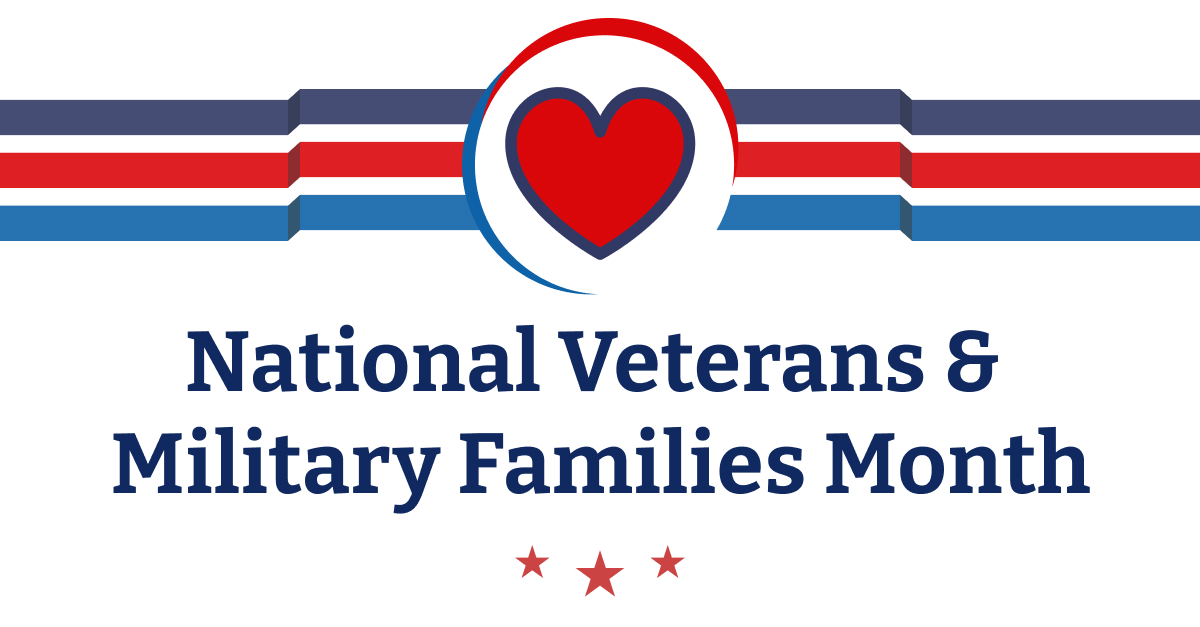November is a time to celebrate the veterans and service members who put their lives on the line for our freedom. But these brave and determined heroes couldn’t do it alone. They have a strong foundation keeping their lives running back home: military families.
Thanks to a service member’s family, they don’t have to worry about an unpaid bill or whether their belongings will be there when they return.
This month is dedicated to not only veterans, but the spouses, parents, siblings, and loved ones who provide support and peace of mind so service members can focus on their mission.
“Our fighting force is the greatest in the world — in no small part because, year after year and decade after decade, military and veteran families have had their loved ones’ backs.”
– President Joe Biden
Join us as we explore the challenges facing military families — such as mesothelioma, a rare and aggressive cancer caused by asbestos — and how National Veterans and Military Families Month offers options for supporting them.
In November and throughout the rest of the year, the Mesothelioma Veterans Center stands ready to help veterans with mesothelioma and their families. Get our Free Veterans Packet to see how we can help.
The Challenges Facing Military Families
When a service member leaves for deployment, their loved ones back home may face anxiety, stress, and isolation as they handle daily life on their own.
Common challenges facing military families in 2024 include:
- Caring for children alone: Any parent knows the substantial effort it takes to care for a child under normal circumstances. Many military spouses report that child care is one of the most difficult parts of supporting a service member.
- Difficulty maintaining a career: A military spouse may need to keep their career aspirations on the back burner since they may have to move at a moment’s notice as a result of military deployment schedules.
- Emotional stress: Military families may experience isolation, depression, and other difficult emotions. In particular, children may feel very concerned about how their parent is doing on deployment. Without managing these emotions, life is much harder for military families.
- Financial stress: Although a military member may send money back home, loved ones have to handle issues with banking, bills, and other financial concerns on their own.
- Service-related asbestos diseases: U.S. veterans who served before the early 1980s could have been exposed to asbestos, putting them at risk of mesothelioma. After a diagnosis, family members may need to step up to provide care for veterans with mesothelioma, which can be overwhelming and stressful.
Ultimately, veterans and military members aren’t the only ones who make a sacrifice: Their families do too.
“The resilience of our families and our children is absolutely what has allowed us to do the things that we’ve asked our force to do. The strength of our nation is in our military families.”
– General Joseph Dunford, Chairman of the Joint Chiefs of Staff
Asbestos Exposure & Mesothelioma Risks
During National Veterans and Military Families Month, it’s important to keep in mind a serious health issue facing many older U.S. veterans: mesothelioma, a cancer often caused by service-related asbestos exposure.
Asbestos was found to have remarkable fire-resistant properties, and as such, it was used by every branch of the armed forces from the 1930s to the early 1980s.
Here are examples of how asbestos was used in each branch of the military:
- U.S. Air Force - Asbestos was used in airplanes, bases, and ground vehicles.
- U.S. Army - Bases, vehicles, and other assets were built using asbestos.
- U.S. Coast Guard - Coast Guard ships and equipment used asbestos.
- U.S. Marines - Marines used ships, planes, and barracks that relied on asbestos.
- U.S. Navy - Each type of U.S. Navy ship and planes contained asbestos.
One of the most common ways veterans were exposed was by serving on Navy ships. Virtually all U.S. Navy ships contained asbestos for most of the 20th century, from aircraft carriers and battleships to Coast Guard cutters and frigates.
If you or a U.S. veteran you love has been diagnosed with an asbestos-related disease, it’s important to know that resources are available.
Resources for Military Families and Veterans in Need
Along with the recognition and awareness that come from National Veterans and Military Families Month, there are also valuable resources to support families of service members and veterans.
These resources include:
- VA Benefits: The VA offers a host of benefits to veterans with mesothelioma and families, including payouts usually worth $3,946.25 a month, free or low-cost medical care, and benefits for survivors. Get help filing for mesothelioma VA benefits.
- Financial Compensation: If you or a veteran you love has mesothelioma, you may qualify for compensation typically worth $1 million or more. We can help pursue this compensation without taking action against the military or government.
- Military and Family Support Centers: These are hubs for families of service members that can assist with everything from relocation to employment assistance. Simply search for one in your area to get started. There are hundreds of locations worldwide.
- Official National Veterans and Military Families Month site: This page hosts a variety of resources you and your family can explore, including counseling services, programs for survivors of veterans, and more.
- Official National Veterans and Military Families Month site: Options like “Love Every Day,” which lets military members communicate with family for a few minutes each day, and personalized coaching can help families stay connected even when they’re on opposite sides of the world.
How You Can Help Military Families This November
While there’s no substitute for military family support, you may be surprised at all the ways that you can get involved in National Veterans and Military Families Month. With a little time, money, and a desire to help, you can make a world of difference in a military family’s lives.
Consider these ways you can assist veterans and their loved ones:
Raising Awareness On Social Media
By simply creating a post on your favorite social media platform and announcing your support for veterans and their families, you’re doing your part to spread awareness.
Donate Gifts or Money
Organizations like the Wounded Warrior Project allow donors to send gifts, toys, and money to military families. Examples of organizations that allow donations include Folds of Honor, Soldiers Angels, American Red Cross, and Blue Star Families.
Volunteer as a Virtual Caseworker
The American Red Cross accepts volunteers who want to serve in multiple capacities. One way to serve that doesn’t involve traveling is to become a virtual caseworker.
After some training, you’ll meet with military members or their families to help them resolve problems they can’t handle alone.
No matter how you choose to give back to veterans and military families, all of your efforts make a difference in helping them overcome the challenges they face.
Remembering Veterans and Their Families This November
U.S. veterans and their family members deserve our honor and respect throughout National Veterans and Military Families Month and beyond.
At the Mesothelioma Veterans Center, we’re proud to have assisted thousands of veterans and their families navigate life after a devastating diagnosis.
Our team can help you:
- Better understand your risk of mesothelioma if you served
- Find a support group that resonates with your needs
- Connect with VA mesothelioma doctors and hospitals
- File for or increase VA benefits
- Pursue payouts often worth $1 million+ to keep your family secure
Get a Free Veterans Packet to learn about all the ways we can assist you and your family.


